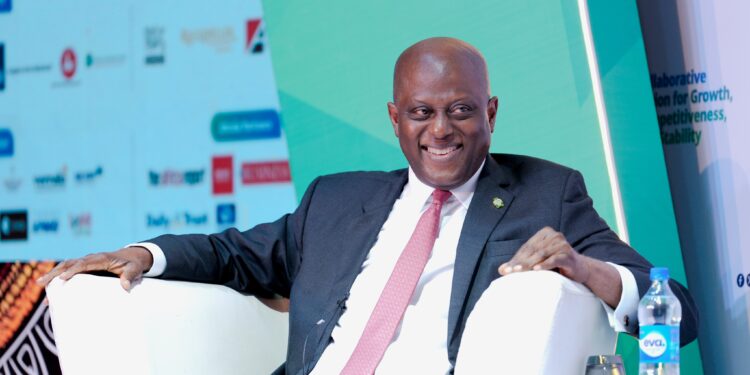Cardoso Predicts Lower Interest Rates as Inflation Slows

The Governor of the Central Bank of Nigeria (CBN), Olayemi Cardoso, has projected that interest rates in the country will begin to decline as inflationary pressures gradually ease and capital allocation in the economy becomes more efficient.
Cardoso, who spoke at the European Business Chamber (Eurocham Nigeria) C-Level Forum in Lagos, explained that the current lending environment, where commercial loans attract interest rates of between 32 and 36 percent, is expected to moderate once Nigeria achieves greater macroeconomic stability.
According to him, the difficult interest rate environment, while burdensome for businesses and households, is a temporary phase. He expressed optimism that as reforms take firmer root and inflationary trends continue on a downward path, rates would naturally adjust to support lending and investment. “There is substantial potential for interest rates to decrease in the future,” he remarked.
His comments came during a fireside chat moderated by Andreas Voss, the Chief Country Representative of Deutsche Bank Nigeria, where he elaborated on the CBN’s priorities. These include strengthening macroeconomic stability, recapitalizing the banking industry, and positioning Nigeria as a more attractive investment hub.
Cardoso acknowledged that inflation remains a concern for policymakers but highlighted evidence of gradual improvement. He attributed this to coordinated efforts between monetary and fiscal authorities.
He noted that while headline inflation is still elevated, it has begun to trend downwards, reflecting the impact of the CBN’s tightening stance and broader reforms. “It is decreasing as a consequence of collective efforts. It is anticipated that the advantages of the CBN tightening posture will persist. We will protect the stability that has been re-established in the financial system with the utmost zeal,” he assured.
The governor reaffirmed that the CBN will continue to adopt measures that safeguard financial system stability, stressing that this remains the institution’s core mandate. At the same time, he underlined the importance of balancing inflation control with policies that ensure banks can continue lending to businesses and investors.
“Our primary objective is to maintain stability while addressing inflation and ensuring that the financial system is resilient enough to facilitate corporate lending and investment,” Cardoso said.
On the issue of strengthening the banking sector, Cardoso restated the importance of recapitalization. He explained that Nigerian banks need to raise their minimum capital to levels that will make them strong enough to weather shocks and sustain growth.
According to him, the recapitalization exercise is not merely a compliance requirement but a forward-looking measure aimed at ensuring that banks are able to fund large-scale projects, support industries, and drive the broader economy. By building more resilient financial institutions, the CBN hopes to reduce systemic risks and enable the sector to contribute more meaningfully to national development.
He added that recapitalization will also improve investor confidence in Nigeria’s financial system, making it easier to attract both local and foreign capital.
Cardoso also emphasized the importance of financial inclusion, noting that the future of Nigeria’s financial landscape depends heavily on access to technology-driven solutions. He argued that improving access to finance not only reduces poverty but also supports entrepreneurship, innovation, and job creation.
According to him, fintech companies and digital banking platforms are already reshaping how Nigerians interact with money, and the CBN intends to continue supporting this ecosystem. By deepening financial inclusion, the apex bank aims to build a more equitable economy where millions of citizens can access affordable credit, savings, and insurance.
“Financial inclusion is not just a policy objective. It is a fundamental pillar of sustainable development,” he noted.
Cardoso praised the increasing collaboration between the Central Bank and fiscal institutions such as the Ministry of Finance, the Ministry of Industry, Trade and Investment, and the Budget Office. He described this synergy as vital for sustaining ongoing reforms and delivering long-term macroeconomic stability.
He stressed that no single arm of government can stabilize the economy alone. Instead, cooperation across all policy-making institutions is required to address Nigeria’s structural challenges, strengthen productivity, and create an environment conducive for investment.
Supporting Cardoso’s optimism, a recent report by the National Bureau of Statistics (NBS) revealed that Nigeria’s headline inflation rate slowed to 21.88 percent in July 2025, compared with 22.22 percent in June. The report showed that, on a year-on-year basis, the rate in July 2025 was 11.52 percentage points lower than the 33.40 percent recorded in July 2024.
The NBS also indicated that urban inflation stood at 22.01 percent in July 2025, down from 35.77 percent in the same month of the previous year. These numbers suggest that inflation, though still high, is on a steady decline.
Analysts believe this trajectory supports Cardoso’s argument that interest rates will likely fall in the coming months, once inflationary pressures are further subdued and the financial system demonstrates sustained stability.
Cardoso’s remarks highlight the delicate balancing act before the CBN: controlling inflation while also promoting lending, investment, and growth. The governor’s optimism reflects confidence in ongoing reforms, ranging from tightening policies to banking recapitalization and closer collaboration with fiscal authorities.
For businesses and investors, the prospect of lower lending rates is a welcome development, as it could ease access to credit, support expansion plans, and stimulate broader economic growth. For households, it raises hope for more affordable borrowing, particularly for mortgages and small business loans.
While challenges remain, including global economic uncertainties and domestic structural constraints, Cardoso’s projection provides a glimpse into the CBN’s vision of a more stable and inclusive financial future for Nigeria.



Responses